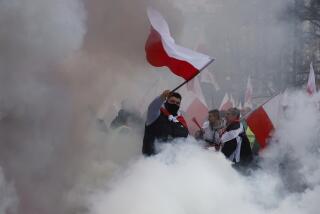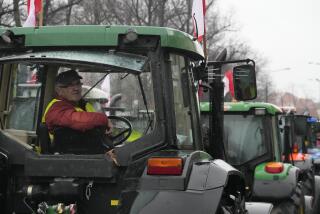From the archives: Democracy Is âAlive Againâ
PIASKI SZLACHECKIE, Poland -- The farmers began arriving in late afternoon, riding in a dozen at a time in tractor-drawn wooden wagons or packed into mud-spattered cars that sagged on their axles. The meeting was at the old brick schoolhouse, where the yard was jammed and the crowd overflowed onto the road.
For the last month, most of the farmers in this district in southeastern Poland have been on strike--keeping their meat and milk off the market, preferring, they say, to pour cream in the hog troughs rather than sell it to the government for a price that no longer makes sense.
Upstairs, in a cramped second-floor assembly room still decorated with the crepe paper of a school dance, Josef Wronski, a longtime activist farmer, was already locked in debate with a score of men, trying to make himself heard over the bleating of loudspeakers that were appealing to farmers outside to keep the road clear and trying to hold his own with Gabriel Janowski, the Farmersâ Solidarity representative sent down from Warsaw. It was going to be a long night.
And, as with most matters in Polish politics, richly complicated.
On the surface, the farmers were meeting here to decide whether to continue their strike.
But a mere scratch below that surface something more was at stake, for this was the opening round in Polandâs first almost free election campaign in the memory of almost everyone present. It was the first skirmish in the battle for the hearts and minds of Polish farmers.
As the meeting here showed, Farmersâ Solidarity has the clear edge against a government and Communist Party Establishment that, the farmers say, has presided for 40 years over the âdestructionâ of Polish agriculture. But, as the meeting also showed, it is going to be no political cakewalk for Solidarity.
Janowski, the Farmersâ Solidarity man from Warsaw, got a taste of the situationâs delicacy at the height of the meeting when someone bellowed at him from the floor:
âWho elected you?â
Chagrined, Janowski could only say, a bit later, âI like it. It shows democracy is coming alive again.â
The tricky part for Solidarity stemmed from the fact that it had nothing to do with the origins of the strike, which was launched by the farmersâ âcircles,â state-sanctioned official farmersâ organizations. The task for Solidarity, beginning here in Piaski Szlasceckie, was to get control of the strike movement, damp it down, and use it to its own advantage in organizing for the elections.
Such fancy footwork was called for because the Solidarity federation, throughout its now-concluded âround-tableâ negotiations with the Polish government, actively discouraged strikes of any kind, helping maintain the generally peaceful atmosphere that accompanied the discussions and leading to a historic set of wide-ranging agreements, including the elections to be held in June.
Against this prevailing mood of sweet reason, pressure for strikes came mainly from the hard-line Communist camp, hoping that any rocking of the political boat would work against the Solidarity-led opposition and reinforce a hard-line backlash.
Whatever the inspiration, the strike call hit a raw nerve with thousands of Polish farmers, and the strike spread, with varying concentrations, across 20 vojvodships , or districts, in Poland.
âWeâre sick of it,â said Florian Wysniawski, a farmer who stood in the schoolyard in a packed circle of neighbors, their faces reddened by the sun and rising indignation.
âOur Farms in Ruinsâ
âForty years,â said one, âand all they have done is leave our farms in ruins.â
âTheyâve raised our taxes,â said Wysniawski. âThe price of fertilizer has gone up 150%--and even then you canât get it. Equipment has gone up 300%. What do they expect? They expect us to sell our milk for 100 zlotys a liter and a bottle of beer costs 250. They expect us to sell a pig for 50,000 and it costs 90,000 to raise a pig.â
âTheyâre always telling us that farmers are going to be important,â said another man, âand always we are last.â
The government, after listening to the protests of farmers meeting in an official congress in Warsaw, agreed to give farmers an average increase of 34% for their products. This news met a show of disdain from some in the crowd, but there was also a feeling that the strike had already been costly enough and that it was time to end it.
By the time darkness fell and the meeting upstairs finally started, the mood was militant, but its direction imprecise. There were probably 4,000 farmers standing around the school, listening to the debate over the loudspeakers.
âOur mood has not changed, but the governmentâs has,â said the first speaker, representing the negotiating committee sent to the big meeting in Warsaw. âThey have given some ground on taxes and prices. I think we have gotten all we can get for now.â He called for an end to the strike.
âYou want to hear that the government has given concessions,â said Josef Wronski, a veteran of many battles with the government, âBut you will never hear this.â He seemed to be urging the strike to continue.
âDoes this satisfy us?â asked another speaker. âCertainly it does not. But the appetite is always bigger than reality. We have the satisfaction of knowing that we forced the government to pay attention to us. Will you vote to end the strike?â
âNo! No! No!â came the shouts from the floor.
Someone handed the microphone to Janowski, and the audience quieted to listen to the voice of Farmersâ Solidarity.
âNow we have no quarrel with our friends from the âcircles,â â he began. âBut we read the newspapers this morning about their congress in Warsaw. And what do we read? We read that the problems of farmers were put aside while a struggle for leadership positions was taken up. . . . Now, if you let me, I would like to tell you about these economic problems we have because you have to see them on a large scale.â
Janowski went on to make his pitch. He said he advocated continuing the strike âin some form, perhaps a state of strike alertâ while the national commission of Farmersâ Solidarity âcontinues its negotiationsâ with the government. Naturally, he suggested, there would be representatives from this district appointed to those negotiations. He went on to lay out Solidarityâs plan, they key feature of which was to index prices of agricultural products to prices of products needed by farmers. âThe price of milk,â he said, âwill be set according to the price of fuel oil.â
Janowski then talked about the importance of the coming elections. Thatâs when the audience began to shuffle.
âPlease, sir,â came a voice from the audience. The microphone was handed down to a red-faced man in front. âPlease, sir, what about you? You say youâre a farmer. Are you on strike?â
âYeah,â came a loud womanâs voice. âWhy are you trying to divide us? â
âWhere have you been for the last month?â another asked.
Janowski lifted his hand to speak.
âWho elected you?â It was the loudest shout of all.
A man from the âcircleâ got the microphone next.
âWe have to make a decision. Are we suspending or are we continuing?â
Another shout from the audience: âWhat have you done for us in the last 40 years?â
The debate went on, in similar fashion, with speaker after speaker taking the microphone, and calling for a vote until after midnight.
On Friday, the strike was still going on.
More to Read
Sign up for Essential California
The most important California stories and recommendations in your inbox every morning.
You may occasionally receive promotional content from the Los Angeles Times.










